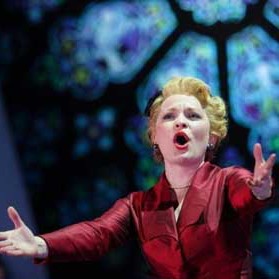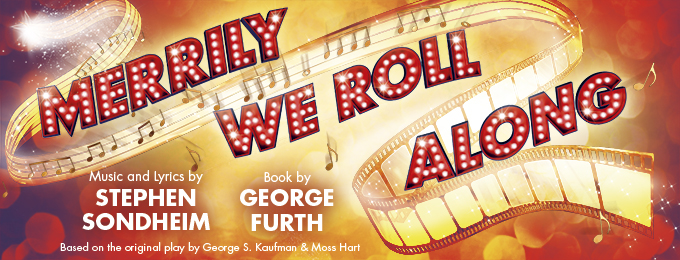Sondheim/Furth “Merrily We Roll Along”, Menier Chocolate Factory (Review)
It seems inexplicable now that Stephen Sondheim and George Furth’s Merrily We Roll Along should have bombed so ignominiously on its first Broadway outing in 1981. But then again what is clearer than ever from Maria Friedman’s immensely enjoyable and touching revival at the Menier Chocolate Factory is that Merrily – in common with pretty much everything that Sondheim and his collaborators have ever written – needs superb acting to bring it off the page and into our hearts. At the Menier it gets just that and because Friedman has cast her trio of leads mindful of where the characters are at the beginning of the piece – which is actually where they would be at the end – we instantly “engage” with their older selves and more readily buy the reverse narrative as two decades of disillusionment are systematically peeled away.
The collective weight of experience that “old friends” Mark Umbers (Franklin Shepard), Damian Humbley (Charley Kringas), and Jenna Russell (Mary Flynn) bring to the show is evident from the sharpness of their observation – and in the opening scene where Mary – now a terminal drunk – offloads her bitterness in a stream of invective on all around her, Jenna Russell’s gin-soaked voice (down an octave at least) and her loose-fitting, spreading-figure, outfit are almost enough to have us momentarily wonder what the actress has been up to since Sunday in the Park with George.
Maria Friedman, of course, played Mary in the 1992 Leicester Haymarket production of the show so some of us, including her, have a very good idea of what 20 years looks like. That version of the show was a quite radical revision of the original and understandably it’s the version she’s returned to here. There’s more book in the revision (typical of Sondheim that he gives free rein to his collaborator in pursuit of greater dramatic clarity) and when you’ve got the casting right (as she undoubtedly has) there’s a tougher foundation in the earlier stages of the show. Gone is the high-school reunion of the opening where Shepard gives his hollow tell-it-like-it-is speech to a bunch of adoring wannabes and I know the scene is clunky but if I’m honest I do miss this way that this bookends with the poignant final scene in the piece where, wide-eyed and hopeful, our three constant companions look to the stars while we the audience have already been where they are headed – to the gutter.
There’s a musical trick – a neat one – in that original opening scene, too. The high-school song “Hills of Tomorrow” is a simple transformation of Frank and Charley’s first hit song “Good Thing Going” and the irony of that goes without saying. But there are plenty more ironies where that came from and the genius of Sondheim’s score is that it allows us to hear songs – or fragments of songs – at various stages of the characters‘ development. Franklin’s first wife Beth (the excellent Clare Foster) sings that aching ballad “Not a Day Goes By” through tears of bitterness on the steps of the divorce court but later (earlier in time) we will hear her sing the same song wreathed in adoration while Mary, who’s always been in love with Frank, simultaneously, quietly, vents her disappointment. This is the tender art of reprise in reverse. Hearing the reprise before one hears the song.
And how subliminally these references find their way into our hearts. A snatch of “Good Thing Going” becomes the accompaniment to an altogether different song and best of all in this revision that self same sweet, subtle, number is turned into a vulgar production number by the acid-tongued Broadway star and Frank’s seducer Gussie Carnegie (the charismatic Josefina Gabrielle) and her slick producer husband Joe Josephson (Glyn Kerslake) who repeatedly insists that Frank (aka Sondheim) doesn’t write hummable tunes.
Merrily has a great score and a big heart and Friedman’s terrific cast ensure that every moment rings true. I don’t think I’ve ever seen “Now You Know” – the act one finale – more convincing (or more exciting) and as Frank, Charley, and Mary regress into their past they do seem to shed years like layers of thick skin, lightening their voices and their physicality until they are unburdened once more. I’ve already witnessed Damian Humbley (Charley) making one miraculous vocal transformation in the recent musical version of Lend Me a Tenor – here his ringing tenor is put to the service of a lovable idealist. And idealism has a sound and a song in “Our Time” which is finally so moving and uplifting that you just want to freeze-dry it.
When Frank first meets Mary on that rooftop in New York and charmed by her clumsy compliment deftly throws away the line: “I’ve just met the girl I’m going to marry” – it really does break your heart.
You May Also Like

A Conversation With KERRY ELLIS
02/09/2011
A Conversation With LUCY SCHAUFER & JULIAN KELLY: ‘The Light in the Piazza’
02/09/2010
